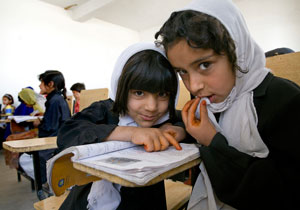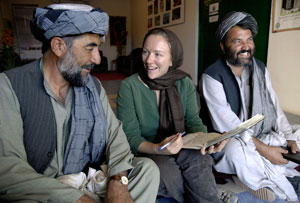How does the quality of Australian aid compare to international best practice?
A new report has confirmed the Australian aid program is one of the most effective international donors to fragile states.
The report also confirms Australia is an effective performer by global donor standards, especially in the areas of promoting transparency and learning.
The new report, prepared by Australia's Office of Development Effectiveness, looks at recent evidence on the quality of Australian aid.
The report draws largely from Brookings Institution analysis of the Quality of Official Development Assistance (QuODA) index [external site], as well as three other global assessments of donor aid performance. The report is based on the latest QuODA data, released in November 2011.
Quality of aid in fragile states
The report found Australia was one of only six donor countries to devote 50 per cent or more of its country-based aid to fragile states. When compared to these five other donors on the QuODA index, Australia is second only to the United Kingdom.
Australia's focus on fragile states is a defining feature of the aid program. This is a reflection of our region, where fragility is widespread and countries often suffer from weak governance. An increasing number of the world's poor live in fragile states, where the delivery of effective aid can be much more complex than in stable and rapidly growing middle income states.
For a focus on effective aid in fragile states, see ODE's brief.
Overall results
The analysis shows that Australia performs above average on promoting transparency and learning, and close to average in three of QuODA's aid quality measures: maximising efficiency, reducing the burden on partners, and fostering institutions. These are strong results given the analysis compares Australia to much larger bilateral and multilateral donors. Since 2008, Australia has made good progress on maximising efficiency, fostering institutions, and promoting transparency and learning. Of 31 donors assessed by QuODA, Australia moved from 21st in 2008 to 16th in 2009 when it came to maximising the efficiency of our aid program; from 14th to 9th on promoting transparency and learning; and from 19th to 17th on fostering institutions.
The report also notes some other key achievements:
- Australia's administration costs are relatively low, one third of some other donors.
- Australia's policy of untied aid is estimated to have saved between $120-$240 million in 2009-10 alone.
- Australia's decision to provide multi-year funding to the World Food Programme helped mitigate the effects of volatile food prices. The decision has already had a positive impact in the response to the crisis in Somalia.
- Australia is one of only 11 donors that have begun to publish aid information in accordance with agreed standards specified by the International Aid Transparency Initiative.


